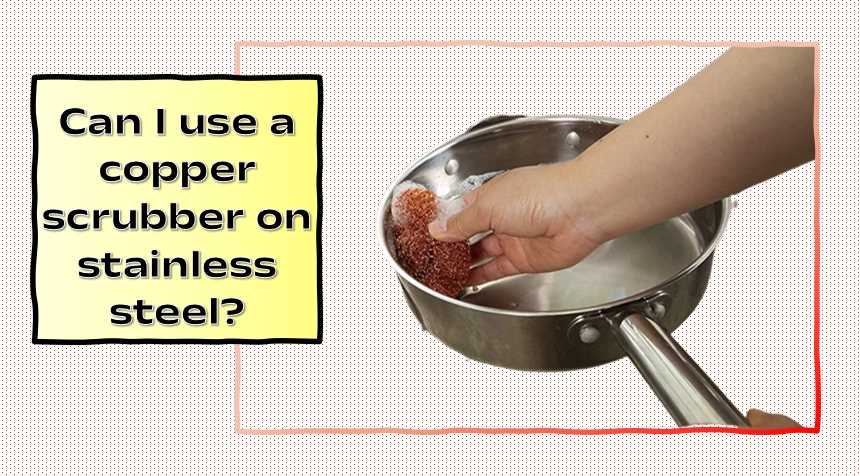Yes, you can use a copper scrubber on stainless steel, but with caution. Copper scrubbers are great for tough stains and burnt food, but they can cause small scratches if used harshly.
In my experience, a copper scrubber effectively cleans stubborn food from stainless steel pots without rusting. However, using too much force can leave minor surface marks. Use the scrubber lightly on polished surfaces to avoid damage, then finish with a soft cloth.
Cookware with a brushed stainless steel finish is less prone to visible damage from copper scrubbers because the texture camouflages minor scratches better than polished surfaces. Use a sponge or non-abrasive scrub pad for regular cleaning to keep your stainless steel cookware lasting longer.
| Cleaning Tool | Cleaning Efficiency | Risk of Scratching | Ideal for Polished Stainless Steel | Ideal for Brushed Stainless Steel |
|---|---|---|---|---|
| Copper Scrubber | High | Medium | No | Yes |
| Non-abrasive Scrub Pad | Medium | Low | Yes | Yes |
| Steel Wool | High | High | No | No |
| Soft Sponge | Low | Very Low | Yes | Yes |
How to use a copper scrubber on stainless steel cookware?
If you have stainless steel cookware that is discolored or has spots, you may consider using a copper scrubber. Copper scrubbers are a great way to clean stainless steel surfaces, and they work by using copper oxide to remove dirt and surface contaminants. This process is a faster and more effective cleaning than using traditional scrubbers. Wet the copper scrubber, scrub the stainless steel surface, rinse it with clean water, and dry it off.
To remove tarnish and oxidation from stainless steel surfaces.
To remove food residue and dirt from stainless steel surfaces.
To clean copper parts that have become tarnished.
What’s the difference between copper and stainless steel scrubbers?
There are a few critical differences between copper and stainless steel scrubbers. Copper scrubbers are a bit more expensive than stainless steel scrubbers, but they are generally considered more effective. Copper is softer than steel, so it is less likely to cause scratches or scuff marks on the scrubbed surface.
Additionally, copper scrubbers are more environmentally friendly because they do not require harsh chemicals or polishing agents.
On the other hand, stainless steel scrubbers are less expensive and easier to maintain. They are also less likely to cause environmental problems because they are built with a stainless steel mesh that does not rust. They are also easier to clean and have a longer lifespan than copper scrubbers.
Benefits of Using
There are a few benefits of using a copper scrubber on stainless steel. Copper is a naturally occurring metal that is non-toxic and contains anti-microbial properties. This action makes it a good choice for scrubbing surfaces, such as stainless steel, prone to microbial growth. Copper also has a high polishability, which means it can remove any oxidation or tarnish from the surface. In addition, copper is a good conductor of electricity, making it ideal for cleaning electronic equipment.
There are many benefits of using copper scrubbers on stainless steel, including the following:
They are effective at removing stains and grease from stainless steel.
Copper scrubbers are effective at removing oxidation and rust from stainless steel.
You can remove scuff marks and scratches from stainless steel effectively.
Copper scrubbers are effective at cleaning and sanitizing stainless steel.
They are beneficial for protecting stainless steel from corrosion.
Are copper scrubbers better than steel wool?
Effective scrubbing depends on the needs of the individual and the cleaning they are looking to do. Some of the most popular scrubbers include copper scrubbers, which are better than steel wool because they are gentler on the skin and have a longer lifespan. Additionally, copper scrubbers are known for removing oil, dirt, and residue from surfaces.
On the other hand, Steel wool is a common choice for scrubbing metals, and this is because it is tough enough to remove rust and tarnish and soft enough to avoid scratching the surface. Additionally, steel wool effectively removes tar, oil, and other pollutants from surfaces. However, it is necessary to note that copper and steel wool have disadvantages. Copper scrubbers are more expensive than steel wool and can take longer to clean a surface.
How long do copper scrubbers last?
Copper scrubbers can last anywhere from 6 to 12 months, depending on the frequency of use and general care. Keep your scrubber clean by rinsing it with fresh water after each use and storing it in a clean, dry place. Please do not use harsh chemicals or abrasives on your scrubber, which could damage it. Finally, read the manufacturer’s instructions to ensure proper usage.
What are copper scrubbers good for?
Copper scrubbers are great for removing dirt, polish, and wax from various surfaces and are also effective in removing bacteria and other contaminants. Copper scrubbers are also easy to operate and maintain, making them a popular choice for businesses and homes.
How do you clean a copper scrubber?
The best way to clean a copper scrubber is to use a lye solution and water. You will need a glass or stainless steel bowl that is large enough to fit the scrubber, lye, and water. Place the scrubber in the bowl, and pour the lye solution over it. Wear gloves and eye protection, and wait until the solution has completely saturated the scrubber. Then use a scrubbing brush to scrub the scrubber until it is clean. Finally, rinse the scrubber in clear water and dry it off.
Why Won’t a Copper Scrubber Work Well on Stainless Steel?
A copper scrubber might not work well on stainless steel due to the difference in material hardness. Stainless steel is harder and more resistant to scratches, so a copper scrubber may not always provide the necessary cleaning power. Additionally, copper scrubbers are softer than steel wool and may wear down quickly when used on stainless steel surfaces. This can result in inefficient cleaning and the need to replace scrubbers more frequently, making them less practical for regular use on stainless steel cookware or surfaces.
Will Using a Copper Scrubber Damage Stainless Steel?
While a copper scrubber is generally safe for stainless steel, it can cause damage if used aggressively. Over time, repeated use of a copper scrubber on stainless steel can lead to fine scratches or dullness, especially if applied with heavy pressure. These small abrasions may affect the polished appearance of stainless steel, reducing its shine. If you are concerned about maintaining the pristine finish of your stainless steel, it’s better to use a softer sponge or cloth for cleaning, especially for everyday maintenance.
What Are the Alternatives to a Copper Scrubber for Stainless Steel?
If a copper scrubber isn’t ideal for your stainless steel, there are other effective alternatives. Non-abrasive sponges, microfiber cloths, and nylon scrubbing pads are gentler options that will clean stainless steel without causing scratches. Additionally, using a stainless steel cleaner or a mild dish soap with warm water can help remove grease and grime without damaging the surface. For more stubborn stains, baking soda or white vinegar can be used to safely lift debris without harming the material.
When Should I Use a Copper Scrubber on Stainless Steel?
You should only use a copper scrubber on stainless steel when dealing with extremely tough or burnt-on food particles that are hard to remove with gentler cleaning methods. For example, if you have stubborn stains on a stainless steel pan after cooking, a copper scrubber can help lift those spots. However, limit its use to occasional deep cleaning rather than daily scrubbing to preserve the long-term shine and finish of your stainless steel cookware or appliances.
Final Words
We discussed the benefits of using a copper scrubber over steel wool when cleaning stainless steel. We also mentioned that copper scrubbers are better than steel wool in cleaning and can last anywhere from 6 to 12 months.
Check out Pine-Sol Heavy-Duty Copper Scrubbers for all your stainless steel appliance cleaning needs! Do you have any questions about this article? Let us know in the comments below!

I may be a little “crazy” when it comes to cooking, but I enjoy every minute of it. Spending time in the kitchen itself, whether with my family or my friends, brings me both happiness and exhilaration. This blog was created to showcase my cooking/eating with family and friends. And also as an opportunity to discuss ideas on food and the culinary circle in general.




